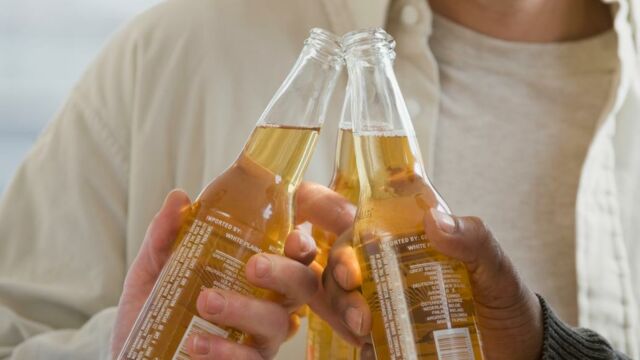If you’ve ever popped open a fresh bottle and recognised the overwhelming smell of bud, you wouldn’t be the only one. Due to a chemical reaction, some types of bottled beer can end up smelling like marijuana. Beer lovers and scientists have coined the occurrence as a ‘skunky beer’, probably because it quite literally smells like skunk. And, it’s all due to a reaction that takes place in the bottle when beer is affected by the sun.
Discover our latest podcast
Dank beer smells have been documented as far back as 1875. Malcolm Forbes, PhD and professor of chemistry, explained to the University of North Carolina that the concept is so well known that it even played into Corona’s lime-wedge marketing: ‘Corona is marketed extremely cleverly.’
What makes beer smell skunky?
In 2001, Malcolm Forbes led a study to determine exactly what makes some beers smell like a dime bag.
The paper, published in Chemistry: A European Journal, found that when beer was brewed, iso-alpha acids were brought forth, giving beer its delicious hoppy flavour. But, when exposed to the sun, these acids turn into free radicals, mix with protein and form a molecule called 3-methyl-2-butene-1-thiol.
This funky chemical can mimic the smell of a skunk’s spray or weed. And, according to the American Chemical Society, the scent is highly potent and can be picked up by the human nose at one part per billion.
Forbes explained: ‘Hops help flavour beer, inhibit bacterial growth, and are largely responsible for the stability of the foam in the head.’
Hops, however, are light-sensitive, and the three main compounds in them identified as being light-sensitive are called isohumulones [the iso-alpha acids]. When attacked by either visible or ultraviolet light, these break down to make reactive intermediates known as free radicals that lead to the offence taste and skunky odour.
What’s better, beer bottles or cans?
With skunky beer being such a common occurrence, it’s hard to imagine why brands such as Corona continue to use such light-exposed bottles. Forbes believed that the clear glass made the drink more marketable as a summer beer. But, it still begs the question:is canned beer better than bottled beer?
Surely nobody fancies buying a rancid beer, and although darker glass is available, it still lets in some light, making canned beer seem like the all-around better option.
Aluminium cans completely block out UV light, which prevents beer from going skunky and keeps it fresher for longer. Cans also provide a better airtight seal than bottles, which stops oxygen from leaking in over time. While certain types of beer, like a Belgian ale, might require an oxygen bottle to ferment, this isn’t something you’d want for your typical brew.
It’s not just freshness that makes canned beer a more superior option; it’s also better for the environment than glass, more portable and doesn’t impact flavour.
But of course, whether bottled or canned, the best brew is the one you enjoy.















